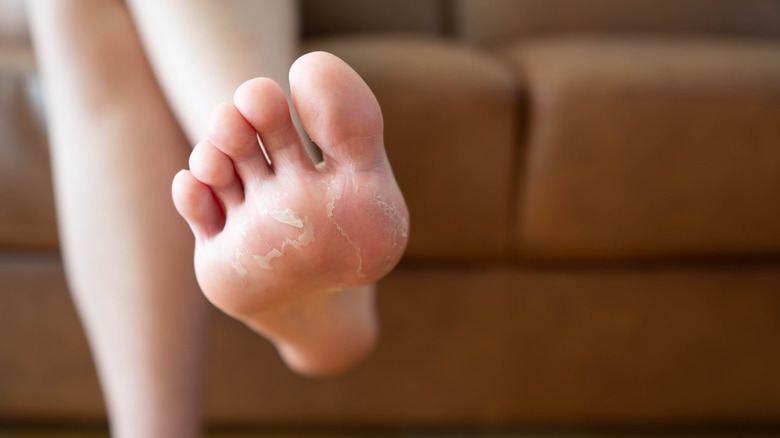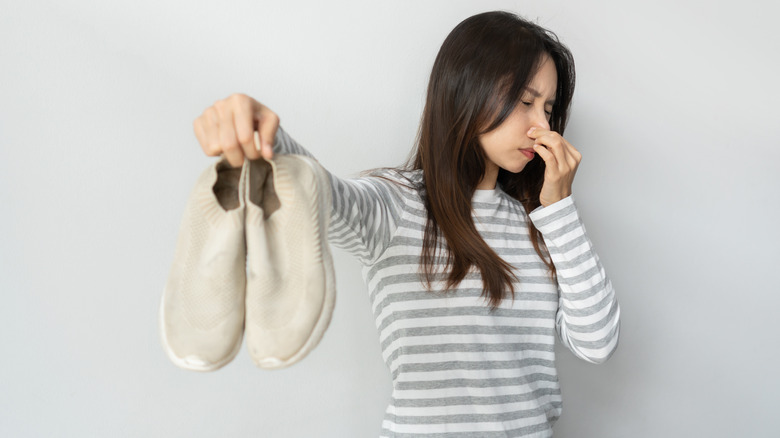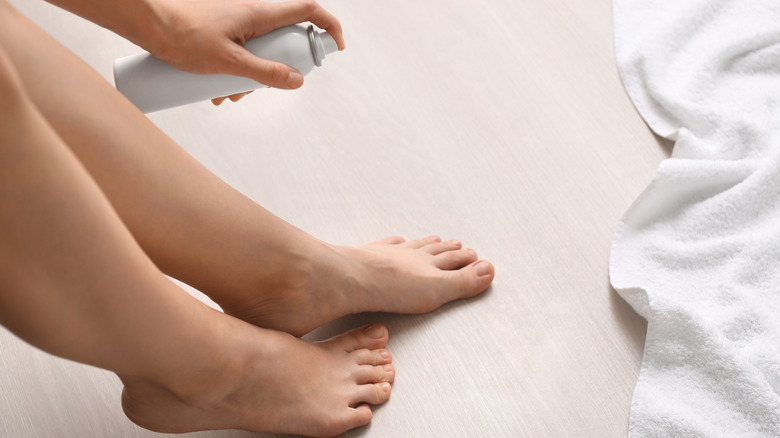Signs Your Foot Stink Is More Than Just Annoying (We Know, It's Gross)
It is universally acknowledged that feet aren't the nicest-smelling body parts. Considering how they're crammed in dark, tight, and sometimes damp enclosures called shoes most of the time, you can't expect them to smell like roses. Relax, it's normal — feet do stink. In fact, the Institute for Preventive Foot Health notes that 16 percent of adults experience issues with foot odor, and if you do the math, that amounts to millions of people experiencing issues with their feet reeking of Parmesan cheese.
But here's the thing: feet are designed to stink. They have more sweat glands than your armpits do. "Your feet are doomed to smell because apocrine glands, like the ones in your underarms, produce perspiration on the soles of your feet," Leslie Campbell, a podiatrist and member of the American Podiatric Medical Association, told Vice. With your feet being essentially a sweat generator, they also attract bacteria, and when bacteria gobble up the sweat, a repugnant stench is born.
Most of the time, you can remedy bromodosis (aka the scientific term for stinky feet) by washing your feet thoroughly and making sure they're dry and socked when you slip on your favorite pair of comfortable sneakers. However, if you notice that your feet are also itchy, inflamed, and/or blistering, the odor may be connected to a bigger, more serious health issue.
How to know if your foot odor is a sign of something serious
The term "athlete's foot" is often flung around when talking about funky feet, but it's a health condition that needs to be taken seriously. Mayo Clinic notes that it's a form of fungal infection characterized by a rash, blisters, or scaly skin, and when left untreated, you risk passing it to other people through skin-to-skin contact or even clothing. The good news is it can be easily resolved through over-the-counter antifungal ointments and prescription-strength medications in more severe cases.
In case none of the treatments work, your stinky feet may be a byproduct of a more serious illness, including diabetes. While having smelly feet may not necessarily mean that you have the chronic health condition, some diabetes patients develop foot ulcers that make it harder to manage and control foot odor. "It's likely that all of these diseases would be found due to other signs or symptoms first," Dr. Nitin Kumar, a board-certified gastroenterologist, explained to Allure. "But in rare cases, the odor may be noticed first."
Alternatively, if you notice that your feet sweat rather abnormally, it may be a sign that you have hyperhidrosis, the skin condition that causes one to sweat more than the average person. There is currently no known cure for it, but Dr. Lian Mack, board-certified dermatologist and assistant professor of clinical dermatology at Mount Sinai Medical Center in New York City, noted that there's a smattering of treatments available to manage it. "This includes oral medications like glycopyrrolate," she told Allure. "Or localized device treatments like MiraDry, medicated swab, and Botox [injections]."
How to take your feet from funky to fresh
You don't have to be overly obsessive about feet care to avoid funky-smelling hoofs, but you have to make an extra effort to ensure that they won't collect putrid odors. You can start by wearing socks when you wear closed shoes (don't worry, your Vejas will still look cool with ankle socks) and then swapping them out with a fresh pair when you know you're going to be out all day.
During warmer months, you may also trade your sneakers and flats to open-toed sandals to give your feet some room to breathe. That way, they won't have to be forced to stay in a cramped space where bacteria are sure to thrive. But if you insist on wearing closed shoes, see to it that the shoes are really clean by disinfecting them with a sanitizing solution. "Take the insole out of the shoe, lightly spray the insole, and let it dry for 24 hours," suggested podiatrist Joy Rowland to Cleveland Clinic. "Then when you put the insole back in the shoe, you've treated the shoe."
When washing your feet, make sure that you're really scrubbing every part, from the soles and ankles to the space between your toes, with soap and water to eradicate germs that lurk in there. It's also equally important to dry them thoroughly before wearing any type of footwear. And if you must, you can always use an antiperspirant or deodorant for extra measure. According to experts, the one you use for your armpits would work just fine.


